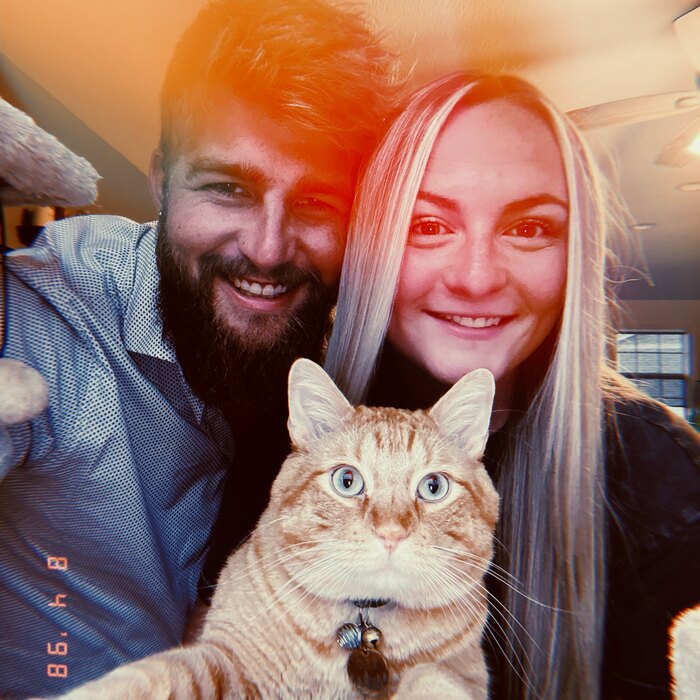
What is your position with Ellipsis, and what does a typical day look like for you?
I'm a therapist at Ellipsis, and if there's one thing about my job, it's that no two days are ever the same. I spend my time meeting with as many kids as possible, helping them work toward the goals they set at intake. My role is to support them in identifying their needs and to ensure they have what they need for their treatment journey.
Collaboration is key, so I work closely with their care team, often attending meetings to determine the best path forward for each child. I also lead a group every Wednesday for a specific cottage, providing a space for connection and growth. And, of course, there’s the necessary paperwork — making sure every child is getting the support and resources they need to succeed.
How long have you worked here, and what initially drew you to Ellipsis?
I've actually been with the company for six years. I was with Youth Emergency Services & Shelter before we merged with Youth Homes of Mid-America. I started while I was in my undergrad. I was an athlete in college, and one of my team captains was working at YESS. When hearing the stories she told, I knew it was something I was interested in. Since I was in school, I knew I wanted to get in the field of social work to gain experience and knowledge. It honestly worked out perfectly because I was learning the terminology in my classes while working and experiencing it firsthand.
Have you had any other roles at Ellipsis? How has your journey within the organization shaped your perspective on the need for the programs and services the organization provides?
I started my journey as a youth care worker. After I graduated with my undergraduate degree, I switched to being an Integrated Health Home (IHH) care coordinator. After about a year and a half, I switched back to being a youth care worker while getting my master’s. IHH provides services for families out in the community. It helps with getting kids on the children's mental health waiver, crisis intervention, providing someone to confide in and so much more. While I was getting my master’s degree, I recognized I needed to take a step back, which is when I switched back to being a youth care worker again.
I love spending time with the kids. I loved taking them out in the community to go bowling or to the arcade. Sometimes we would go to the farmers market to look around at all the different stands. That’s one thing I miss in my current role, experiencing life with them and just being there for them every single day. As a therapist, I only get to see them maybe once or twice a week. I wouldn’t change what I’m doing, though. I’ve wanted to be a therapist since I was in middle school.
I take a lot of pride in the fact that I was a youth care worker and supported IHH care. The experiences I have in each of these roles are very different, but I know it’s helping me more in what I do today. I know what these kids have been experiencing at home. I know what’s available to them outside of Ellipsis and what they can and can’t do while they’re here. It helps me be able to make intentional and thoughtful recommendations for them.

Please share a story about an experience that reaffirmed why you do this work. What made it so meaningful?
One of my middle school counselors had a huge impact on my life. While my parents were going through a divorce, she supported me mentally and emotionally in a way that truly made a difference. She taught me so many valuable tools and life lessons, and from that experience, I knew I wanted to have the same kind of impact on someone else.
When I transitioned back to being a youth care worker from IHH, one of my former IHH clients ended up at our shelter. I remember sitting outside with her for an hour and a half at her house, having a deep conversation. When she came to the shelter, I had just started working on the girls unit. We spent a lot of time together, and by the time she left, I had transitioned into a therapist role. I stayed on her case but more so as a support/mentor.
Now, she’s 18 and in college, working to become a CNA. It’s incredible to see how far she’s come, given the obstacles she’s had to overcome throughout her life. Thinking of her always reminds me that these kids, despite the incredibly difficult experiences they’ve been through, have so much potential. They just need someone to see it in them.
What are some of the biggest challenges you face in this job, and how do you overcome them?
I think sometimes the biggest challenge is getting creative with our program limitations. I can't implement things I would outside of Ellipsis, like going for a walk around the community alone as a coping skill. However, I collaborate with their care team to ensure we know what they need, follow up to see how things are working for them and make any changes to give them the best we can. We make sure we exhaust all of the options that could benefit the child and give them the right tools. Ellipsis is just a stepping stone, really. So, we have to do our best while they’re here to find what truly can help to improve their overall success in life.
What’s one thing you wish more people understood about the work you do?
The impact we make sometimes can only go so far. If our clients aren’t using the tools we provide, our ability to help is limited. Ultimately, personal growth is in their hands — we can offer guidance and support, but real change has to come from them.
If you could describe your job in three words, what would they be and why?
It's definitely rewarding. I love witnessing those aha moments when kids realize that the tools we provide truly work. Seeing them achieve milestones, gain confidence and take pride in their progress is incredibly rewarding. Seeing their excitement when they say things like, “I was upset, but then I took a step back, wrote in my journal about how I was feeling and instantly felt so much better,” makes it all worthwhile.
It's also challenging because every case is different. I have to be able to adapt, knowing what works for one kid isn't going to work for the next. Collaborating with a child’s entire care team — like their case managers, attorneys, Department of Health workers and juvenile court officer, if they are involved — can be difficult sometimes since we all have different viewpoints on what might benefit a kid, but being able to work together and collaborate really makes that challenge worthwhile.
And, of course, it’s educational. The kids are always teaching me things every single day, from different slang to working with them on their personal experiences and needs. I’m having to continue to educate myself through trainings and reading up on new therapy techniques.
What’s one piece of advice you’d give to someone considering a career in youth services or mental health support?
I did retail. I tried the restaurant service industry. For me, I didn't like it very much because it was cookie-cutter. In this job, you never know what you're going to walk into. Every day is a little bit different. I don’t mean in a chaotic way — because we do have routines and structure here — but it can be in fun ways. These kids are comedians. It's not boring, and the conversations are always something new and different because their problems today are different from their problems yesterday. I absolutely love it.
If you're looking for an educational career that offers versatility, challenges you to grow and is far more rewarding than most other jobs, you should do it!
What’s one thing about Ellipsis that makes you most proud to be part of the team?
The first thing that comes to mind is the impact each person here can have on a child or family — helping them see a brighter future when they might feel like there’s no way forward. Some clients may believe things will never get better, but we have the opportunity to show them otherwise.
Being there for them, alongside their Ellipsis team and workers, sends a powerful message: “We’re in this together, and we won’t give up on you.” Watching them make progress, celebrate their successes and rediscover hope is incredibly meaningful. It’s just as rewarding to see clients out in the community getting the supports and services they need that some might not even have known existed prior to reaching out.

Outside of work, what’s something that brings you joy?
My friends and family bring me so much joy, and my dog and cat mean the world to me. I love staying active, whether it’s playing sand volleyball in the summer, rollerblading with friends or simply spending time outdoors. I also enjoy traveling, especially visiting my college roommate in Kansas City with friends. Life keeps me busy in the best way — filled with fun activities, great company and plenty of self-care along the way.
